- Home
- Samantha Shannon
The Mask Falling Page 5
The Mask Falling Read online
Page 5
“No. I’m sorry.” I gently broke her grip. “Is Le Chevalier des Deniers your . . . boss?”
Disappointment stiffened her face.
“Yes. The patron of this district,” she said, her voice flat. “Le Chevalier des Deniers rules the Court of Miracles. We give him our earnings. In return, he keeps us fed and safe. Or so he claims.”
Katell was describing a mime-lord, or something akin to one. She was our first link in the chain.
“I suppose he reports to someone else,” I said.
“The grands ducs.” Katell stepped back. “You must be new to the district. To the citadel, perhaps.”
“I’d like to introduce myself to the grands ducs. Any idea where I might find them?”
A frown pinched her brow. “No one sees our leaders without invitation. If I wished to see them, I would ask Le Chevalier des Deniers, and he would—he might—petition for me.”
“They’ll want to see me.”
“Madelle, they will never receive you unless you petition. Save yourself a wasted journey.”
“A name or a place. That’s all I need.”
Fresh hope jumped into her eyes. I had dredged my words with false impatience. Impatience pointed to desperation, and desperation pointed to need. This woman knew those refrains.
“Our leaders hold court in les carrières,” she said under her breath. “For a price, I can give you a name. An old friend who knows the way inside.” She held out a hand. “Two hundred.”
I almost let her fleece me, just to throw her a bone. “No name in Paris is worth that much coin, as you well know,” I said. Her cracked lips pressed together. “Since I’m feeling generous today, I’ll forgive you for trying to rip me off. Fifty.”
“I cannot risk my life for fifty. If anyone finds out I have shared information about the carrières with a stranger, I will leave my child an orphan.” Her hand trembled. “Ninety.”
“Seventy, Katell, or I walk. I’m sure someone else around here could use the money.”
I kept my nerve until hers failed. When she gave a stiff nod, Arcturus took the right amount from his coat. Katell snatched the notes from him and stuffed them into her skirt pocket. She beckoned me close and whispered into my ear: “Montparnasse. Find Mélusine.”
“Where in Montparnasse?”
“She could be anywhere in that district.”
“Do you have unregistered cabs in Paris, the sort that will take voyants without questions?”
“Anormales, or anormaux,” Katell corrected. “That is what we call ourselves here.” She took a step back. “The cabs have blue paint over the wheels. Look for them beside any triumphal monument. The nearest is the Porte Nord.” Another step. “Please, ask no more of me.”
I nodded and turned to leave. A few paces later, I realized Arcturus wasn’t with me and looked back just in time to see him give Katell an extra few notes. She took them as if they would bite her.
“She cannot have given birth more than a week ago,” Arcturus said to me, once he caught up.
Tenderness surged in me. “I know. I wanted to give her more, too,” I said, “but we have to be careful how much of that cash we spend. With Alsafi gone, I presume we’re going to have a lean period.”
“Most likely. Unless Burnish can help us, Terebell fears the line of communication with our financiers could be lost.” Arcturus fastened the top of his coat. “You are right to recommend frugality.”
I wished Scion had more room for compassion. I wished I didn’t feel the need to curb it in him.
“So. This Man in the Iron Mask.” I pushed my hands into my pockets as we pressed on. “Think it’s a Rephaite?”
“A Rephaite would not abduct a human. My kind would leave such work to underlings.”
A disquieting thought occurred.
“The Rag and Bone Man vanished after the scrimmage,” I said. “No one saw or heard of him again after that night, even though I put a substantial bounty on his head. He has an unusual aura, like you. If he was the attacker, that could be why Katell mistook you for him.”
“You believe he may have fled here.”
“Maybe. If he did, I’ll wager he’s up to his old tricks. Selling voyants to Scion again.”
“There is no reason to fear that the gray market has resurfaced. Caron may simply have been arrested.”
“True. I suppose he could also have had a run-in with debt collectors. Or vigilantes. All kinds of ways to disappear in Scion.” I spoke with more conviction than I felt. Something felt off. “For now, let’s just find the syndicate. Remind me what carrières means?”
“Quarries. Katell was referring to the system of abandoned mines and ossuaries that lies beneath the skin of Paris, which covers at least two hundred miles. Scion has never been able to map it.”
“Sounds like the perfect hideout. And Mélusine could be our key to it. Our next link.”
“She will still be in the citadel tomorrow, Paige. It can wait.”
“I’m not tired.”
A barefaced lie. We both knew it. I also knew that if I didn’t push myself, I would never get my strength back.
“It will be safer if we separate for the journey,” Arcturus said. He stopped and handed me a roll of notes. “For your cab. I will meet you at an establishment in Montparnasse—La Mère des Douleurs. Ask the waitron for a café sombre.”
“Café sombre.” I raised an eyebrow. “Is the goal to sound as much like a tourist as possible?”
“Indeed. An ostensible mistake that will not attract unwelcome attention.”
“You really are the prince of mystery, you know that?”
“Yes.”
I tamped down a bout of nerves as I tucked the cash away. I couldn’t be afraid of striking out alone. If I let that sort of dread set in, it would mean the torture had broken something I might never fix.
“A gloomy coffee at the Mother of Sorrows.” As I turned away, I threw him a smile. “You really know how to show a girl a good time, Arcturus.”
I was sure the corner of his mouth flinched.
3
Gloomy Coffee
It was a short walk to the Porte Nord. Two pickpockets trailed me for a while, but when I turned and gave them a level stare, they melted away.
Carven faces gaped down at me from the triumphal arch, which honored the French soldiers who had fallen at the Battle of the Iron Gates during the Balkan Incursion. Idling across the street was a car with dabs of azure paint above its wheels. I climbed in, gave the address, and we were off. The cabbie smoked like damp kindling and paid me little mind.
Dull pain throbbed in my temple. Twice I snapped out of a drowse. The car rattled back over the river and into the south of the citadel, where it braked outside the shell of a church. I paid the cabbie and waded through a snowbank, toward a coffeehouse on the corner.
La Mère des Douleurs didn’t look as if it hid any secrets. The awnings over its outdoor tables were heavy with snow, its façade peacock blue, and bay windows flanked its door, each square pane laced with frost. The menu promised hot spiced mecks and Lyonnaise-style cuisine.
Inside, I scraped mud and snow from my boots. Customers lounged on wicker chairs, eating and talking. I checked my lenses were still in place as a waitron approached me.
“Bonjour,” she said.
“Bonjour.” Hoping I wasn’t about to make a fool of myself, I went for it: “Je voudrais un café sombre, s’il vous plaît.”
She didn’t miss a beat: “Très bon choix, Madelle.”
I followed her to the back of the building, past tables and framed photographs, and she took a key from her apron. She led me through a concealed door and down a winding flight of steps.
We descended into a tunnel, which resonated with chamber music and the beehive hum of a hundred conversations. It seemed many Parisians had a taste for gloomy coffee.
The waitron escorted me past a statue of a veiled woman, who seemed to be holding her own heart. Candles glimmered at her feet. An
amaurotic was on his knees before her, hands clasped, head bowed. Dim impressions came to me: fragrant smoke, voices raised to a vaulted ceiling. Tendrils of a memory.
The coffeehouse was a warren of cozy spaces, lit by tapers and cluttered with tables. A peppery fug of tobacco and regal hung in the air. The vast majority of these patrons were voyant. I was getting closer.
In the largest chamber, where a quartet of whisperers played baroque violins, several alcoves served as private booths, cut off from the rest of the coffeehouse by red velvet curtains. I took the last vacant one and slipped into an upholstered seat. The waitron set down a glass of hot blood mecks and a basket of bread before she closed the curtains. I removed my gloves and read the menu, which boasted such delicacies as cassoulet au cimetière and tarte ténébreuse.
My eyelids were heavy. Now that I had stopped moving, all my aches had crept back in. I kept my coat on and burrowed into it.
Arcturus soon joined me in my alcove. The curtains fell together in his wake, muffling the clamor again.
“This place is so . . . you.” I took a slice of bread. “How on earth do you know your way into a secret coffeehouse?”
“You sound surprised,” Arcturus said. “I have been a revolutionary for a very long time.”
“Oh, yes. Such a rebel, with your organ-playing and gramophones and good manners.”
“Are you mocking me, Paige Mahoney?”
“Fondly.” I smiled into my glass. “Seriously, how did you find this place?”
“After France pledged to Scion, this crypt was used first for clandestine religious services. Later, artists and musicians discovered it, too,” he said. “Nine years ago, Nashira sent Alsafi to find a seditious painter, and his investigation led him here. He told me about it.”
“Did he turn the painter over?”
“Yes, though he did not betray the crypt. Alsafi did only what he believed was necessary to keep his place beside the blood-sovereign.”
Alsafi had made ruthless choices. He had sacrificed others to maintain his cover, but given his own life to save mine.
I pushed the memory aside. “Why are we here?”
“Two reasons,” Arcturus said. “The first: since this is a crypt, it may connect to the carrières, or serve as a meeting place for those who know their way in. Perhaps you can find a link to Mélusine.”
“The thought had occurred.” I stole a glance between the curtains. “And the second?”
“To give you an opportunity to rest.”
That made me look back at him sharply. “I’ve rested for three weeks,” I said. “We need to start looking for Mélusine now if we’re going to make it back to the safe house by dusk.”
“Half an hour to eat and warm yourself.” He held my gaze. “Tell me you do not feel drained. Tell me this day has not taken its toll on you, and we will leave.”
I drew in a breath to lie to him. As if to mock me, pain sliced into my chest, so deep I had to set my jaw against it.
“I hate this,” I said. “This weakness.” My exhalation made the candle flicker. “I used to be able to run all night. Fight off thugs twice my size. Now this.” I wrapped my hands around my glass. “Our mutual friend might not have killed me, but she’s left me essentially useless.”
“You believe all those she has tortured are rendered useless, then.”
That made me look up.
“Sorry.” I reached across to touch his wrist. “I didn’t mean that. Of course you’re not.”
“Tell yourself the same.” The candle made shadows feather over his face. “There are always other ways to fight.”
Perhaps it was the low pitch of his voice. Perhaps it was the warmth of him beneath my fingertips, a reminder of when his arms had drawn me close. Perhaps it was the red drapes that concealed us.
His eyes darkened, and I was sure we were recalling the same night. I let go of his wrist.
“All right,” I conceded. “I’ll eat one of these morbid-sounding meals. And then we’re going to find Mélusine. Agreed?”
“Agreed.”
While I drank my hot mecks, I thought of how I had instinctively reached for him. Only two weeks ago, I had been racked by fear that I would never share that casual intimacy with another person again. While Suhail Chertan tortured me, he had told me over and over that I was repulsive. Then the Vigiles had taken their turn to beat and waterboard me.
For over a week after the escape, I had shied away from Arcturus, afraid that Suhail had been right—afraid of any touch at all, because for too long, every touch had caused me pain. The fact that I could reach for him now, without thinking, was a small victory.
A different waitron came to take my order. “Your French is excellent,” Arcturus said, once we were on our own again. “You speak as if you were born to it.”
“Thanks. I started learning it in Ireland, but I was lucky to have a very good teacher in London, too,” I said. “She thought my speaking Irish was an asset. I was conversationally fluent in French by the time I left school, and I’ve worked on it ever since.”
After a pause, he said, “Did something happen to her?”
He was getting better at reading my expressions. I looked down.
“After we left Ireland,” I said, “I begged my father to keep speaking Gaeilge with me at home so I wouldn’t lose it. He refused. I’d hold long conversations with myself in secret, but I was only eight when we left Ireland. There were words I didn’t know. Madelle Alard somehow got hold of a dictionary so I could keep teaching myself.” The candle flickered. “She was hanged for sedition about two years ago. I suppose she helped one too many outcasts.”
“I am sorry.”
I nodded, trying not to remember the day I had walked past the Lychgate and seen her.
The waitron came back with a silver tray. She placed my food in front of me—served in a burial urn, no less—and shut the drapes behind her.
“They’re committed to their theme down here.” A casserole of sausage, white beans and mutton was baked into the urn. I dug in. “Enough about me. Tell me how you get around citadels so fast without anyone seeing you.”
“I am surprised that interests you,” Arcturus said. “You have been able to evade Scion for months.”
“Tell me anyway.” I blew lightly on my forkful. “Now that I’ve got the chance, I’m going to ask you everything I can.”
“Rephaim are not wholly corporeal,” he said, as I ate. “Our sarx allows us to circumvent some laws of the human world. Cameras see little more than a shadow when I pass.”
“I knew there was something.”
“I do not wish to seem opaque to you, Paige. You may ask me whatever questions you wish.”
“Will you answer?”
“When I can.” Once I had eaten some more, he spoke again. “How do you mean to find Mélusine?”
“I know the underworld.”
“Paris is not London.”
“No,” I agreed. “Which is interesting, because Scion tries hard to regulate its citadels. The blue streetlamps, the cohorts, the white cabs and buses.” I scraped up some more of the casserole. “I suppose you can never tell a city what shape to take. Still, Scion has done us a favor by attempting to standardize the unstandardizable. The underworlds will have similarities, because they were created as safe places in citadels designed to give us no safe place. They’re the gaps between the bones. Similar bones, similar gaps—which means I should be able to navigate them.”
Arcturus looked at me, long enough that it made me more aware than usual of the way I was sitting, the fall of my hair, the space between us. Not for the first time, I wished I could hear his thoughts.
“I am glad to be with you in this particular citadel,” he told me. “No matter its shape.”
“Likewise.”
“And I think you are enjoying being my mentor.”
“I would never be so petty.”
“Liar.”
“Fine. It does give me a little satisfaction.”
“I daresay you have earned it.”
I polished off the sauce with some more bread. As I did, I kept one eye on the customers through the sliver between the curtains.
For a while, nothing caught my attention. Then a medium passed a group of soothsayers, and I watched a note scrunch from one hand to another. The medium crossed the chamber and was gone. Not long after, having skimmed the note and finished his cup of saloop, the soothsayer picked up his coat and left in the same direction.
“I may have just found that link.” I shifted out of my seat. “Meet me at the church. Twenty minutes.”
****
In the short time I had been underground, clouds had stonewashed the sky. Snowflakes wafted around me as I shadowed the soothsayer, keeping him just in sight. When he waded through a snowdrift and into a backstreet, I followed my hunch and went after him.
The street was a dead end. I hung back in a doorway while the soothsayer waited under a lantern. Before long, a girl appeared and handed him a package from her satchel. He gave her an envelope in exchange. I retreated farther into the doorway so he could leave without seeing me.
That parcel would either contain numa or ethereal drugs. Either way, the girl had a supplier. This was the next link in the chain.
She tucked the money into her coat. At my end of the alley, she stopped, like a hare catching a scent. Before I could so much as tense, she sprinted between two cars, leapt up to catch the top of a barrier, and vaulted over it.
Using my gift to keep track of the girl through the walls, I ran straight for a parallel street. She had taken a path that wound through the courtyards of the nearest buildings. I pulled ahead of her, into a crowded section of the district, and hid behind a tree.
The girl reappeared outside a cookshop and peered across the street. Once she had judged it safe, she set off again. I tailed her at a distance through a pair of rusted gates. Even before I saw the silver lettering above them—le cimetière du sud—I knew what the place was.

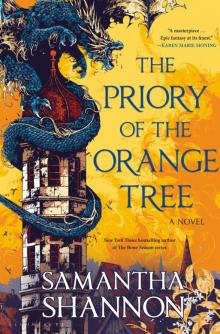 The Priory of the Orange Tree
The Priory of the Orange Tree The Dawn Chorus
The Dawn Chorus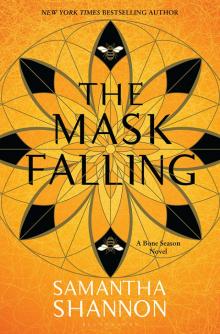 The Mask Falling
The Mask Falling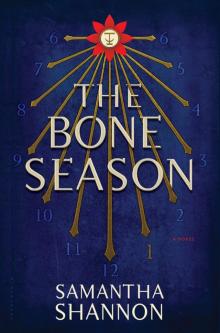 The Bone Season
The Bone Season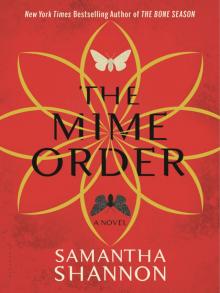 The Mime Order
The Mime Order The Song Rising
The Song Rising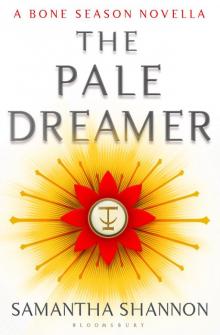 The Pale Dreamer
The Pale Dreamer